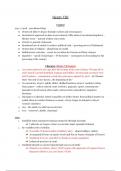Henry VIII
Context
1509 23 April - proclaimed King
● Destroyed father’s legacy through warfare and extravagance
● Inconsistent approach to aims in government, little interest occasional/impulsive -
themes recur = pursuit of glory/succession
● Priority to pursuit of pleasure
● Broadened use of statute to achieve political ends = growing power of Parliament
● Destruction of religion + plundering of wealth
● Ruthlessness/cynicism = resort to execution for treason on flimsy charges
● Impulsive = speed of marriages + FP decisions = consequences devastating for the
governing of the country
Character (Henry VII Legacy)
1. Accession ushered a new age after the tyranny of the end of Henry VII reign (B+R,
and Council Learned abolished, Empson and Dudley, arrested and executed, Oyer
and Terminer - commission to look into grievances against H7 govt) - Sir Thomas
More “the end of our slavery...the beginning of joy”
2. No experience of govt/ public affairs, disliked business of govt/ reading/writing
State papers - rather enjoyed court activities, pageants, sports, tournaments -
Sporadic in involvement often made controversial/contradictory/impulsive
decisions
3. Marriage to Catherine suited councillors to deflect Henry from political matters to
enable them to conduct business as usual - Henry happy to delegate to Royal
Council/ ministers
4. Guy - his mind was able but second rate
5. Ives - “extrovert, affable, charming”
Aims
1. Establish status amongst European monarchs through marriage
➔ Catherine of Aragon 11 June 1509 (retain Anglo-Spanish relations)
2. Re-establish role of nobility
➔ Peaceable FP denied outlet of military glory - shared military culture
➔ Accompanied Henry in sports/revels and War in France (Marquis of Dorset)
➔ Abolished B+R 1510 cancelled 175 bonds to ensure popularity
➔ Enhanced presence at court
3. Establish himself as warrior king through success in battle
➔ Wanted to overthrow Henry VII FP, began with aggressive FP against France
financed with the £300,000 Henry VII left
,➔ Expensive, little gain, no significance
➔ Nobles trained in combat bored with H7 period of peace
➔ H8 learned stories of H5’s victory at Agincourt
, Government and Parliament
1. 1514-29 Ascendancy of Wolsey
- Royal almoner on Henry’s accession, came to his attention as result of
organisational abilities
- Minor member of Council more prominent imposing himself between the
king and experienced councillors (frozen out)
- Rise to influence - conciliar approach to govt dissolved, broke down due to
Henry’s impulsive personality, inherited conservative advisors reluctant to
support war with France, surrounded by young courtiers who backed
suspicions of ‘old guard’ = Wolsey left as dominant political figure
- 1514 - Archbishop of York
- 1515 - Cardinal, Lord Chancellor
- 1518 - Papal Legate - acquisition of Church offices + secular posts symbolic
of political influence/status) - King’s mouthpiece
(articulate/intelligent/skillful at presenting the king’s case)
2. Parliaments:
1510 Abolished Council Learned
1512-14 Extraordinary revenue invasions France, Scotland + Anticlerical Act
1523 ER invasion France - Wolsey didn’t manage Parliament well, ER resistance
1529-36 ‘Reformation’ Parliament
1536- Succession Act following fall of Anne Boleyn
1539-40 ER invasion threatened +religious legislation (greater dissolution)
1542-33 ER invasion France, Scotland + issue of succession
Wolsey’s Domestic Policy
1. Court of (Conscience) Chancery - 1515 Lord Chancellor, tried to use the court to
uphold ‘fair’ justice. Heard problems with enclosure, contracts, wills. Too popular,
justice slow (heard 7,526 cases, passed Enclosure Act 1515, 1517 sent out 17
commissions to see if law being enforced = 264 prosecutions)
2. Court of Star Chamber - Wolsey’s most distinctive legal contribution, motive was to
increase cheap and fair justice. Accessible to all, pushed for cases of weaker
members of society to be heard - 1519 set up a permanent judicial committee dealing
with cases involving the poor. Pressure for business - overflow tribunals
3. Finance - ‘Tudor Subsidy’ taxpayers/nobility provide extraordinary revenue when
required, achieved by raising subsidies, Wolsey made changes on how this was
achieved. Headed a national committee to assess the wealth of taxpayers, instead of
local commissioners being overly generous to nobility, to collect ER for war in
France. Insufficient funds, attempt raise unparliamentary funds ‘Amicable Grant’
1525 (should be freely given gift but was a heavy tax without parliament's approval)
met with resistance in north Essex/Suffolk:





